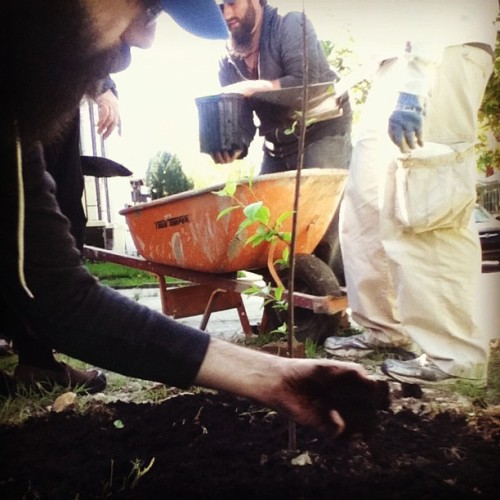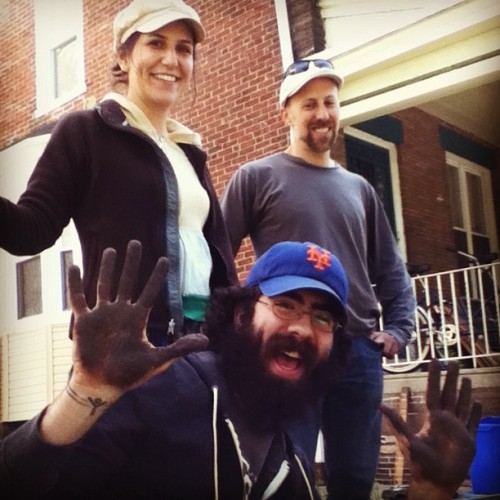The Shmita narrative is one that is founded upon great social ideals and values; as we begin to learn about the holistic, integrated models that Shmita is encouraging, the only way to really begin understanding this is to use the Torah texts as a springboard to action, to experimentation, to embodiment. Yes, there is clear value in learning for the sake of learning and understanding. But as the Rabbis famously ask, which is better: Action or Study? Study, they say, because it leads to action. Study is the first step into personally investing one’s self towards manifesting the values learned in their own personal and communal lives.
The Shmita Work Party model is one that begins with text study and follows with a tangible action that directly relates to the values learned. In this way, the learning continues seamlessly into the action, and the words of the text take shape in active creations. For example, one key principle of Shmita is the fact that primary harvests during this year were based upon perennial and wild plants. In a learning session, texts which can be studied would include anything about Shmita harvests, tree planting from a Jewish perspective, etc…and then followed by actual fruit tree plantings.
In our BEHAR campaign to raise Shmita awareness on a local level, one model which we offered was a Shmita work party. Funny thing is that Shmita, like Shabbat, creates a space for rest and release. But to get to this point, there is also learning and preparation to be done. Jewish Farm School, located in urban West Philadelphia, hosted a Shmita Work Party as part of their Shtetl Skill Building Series. Here is a recap of their event by Cassie Pena of the Jewish Farm School:
Coinciding with Shabbat Behar, Jewish Farm School launched the Shtetl Skills Workshop Series, a program dedicated to reviving the traditions of Jewish homesteading. Shtetl Skills was developed with the intention of introducing participants to Jewish agricultural laws, ancestral folkways, and contemporary ecological principles. With this in mind, our sessions will focus on developing an abandoned lot in West Philadelphia with the intention of creating a community urban farm, skill development site inspired by Shmita.
 Philadelphia, like most urban communities, is littered with unused land, creating unsightly, dangerous and wasted space that could have community value if cultivated. These spaces are typically owned by private individuals but left abandoned due to legal or monetary issues. Shmita tells us that at the end of seven years, ownership of the land is released and the land is to be enjoyed by all. Philadelphia law tells us that land is released to the commons after three cycles of seven, or 21 years, if it is being improved by an individual or group of individuals.
Philadelphia, like most urban communities, is littered with unused land, creating unsightly, dangerous and wasted space that could have community value if cultivated. These spaces are typically owned by private individuals but left abandoned due to legal or monetary issues. Shmita tells us that at the end of seven years, ownership of the land is released and the land is to be enjoyed by all. Philadelphia law tells us that land is released to the commons after three cycles of seven, or 21 years, if it is being improved by an individual or group of individuals.
Nati Passow, Jewish Farm School’s Executive Director, and Joshua Boydstun, Reconstructionist Rabbinical College student and Jewish Farm School Rabbinic Intern, began our first session with a group of 12 students in Talmudic and modern law text study central to land possession and the legal rights of squatters. Learning and discussion was followed by digging into the the lot. Together we prepared garden beds, tore down a fence and planted native species for food and beautification. The day closed with a communal plum tree planting.
 Future Shtetl Skill Workshops will build on the principles of communal sustainability inherent in shmita and permaculture. Over the spring, summer and fall this space will be transformed with intention and openness. Of course, when improving land owned by someone else we are open to the risk of repossession. We hope, however, that in an effort to improve our communal space we are reigniting healthy, sustainable Jewish values and greener, harmonious urban communities that will one day be shared by all.
Future Shtetl Skill Workshops will build on the principles of communal sustainability inherent in shmita and permaculture. Over the spring, summer and fall this space will be transformed with intention and openness. Of course, when improving land owned by someone else we are open to the risk of repossession. We hope, however, that in an effort to improve our communal space we are reigniting healthy, sustainable Jewish values and greener, harmonious urban communities that will one day be shared by all.




Comments are closed.